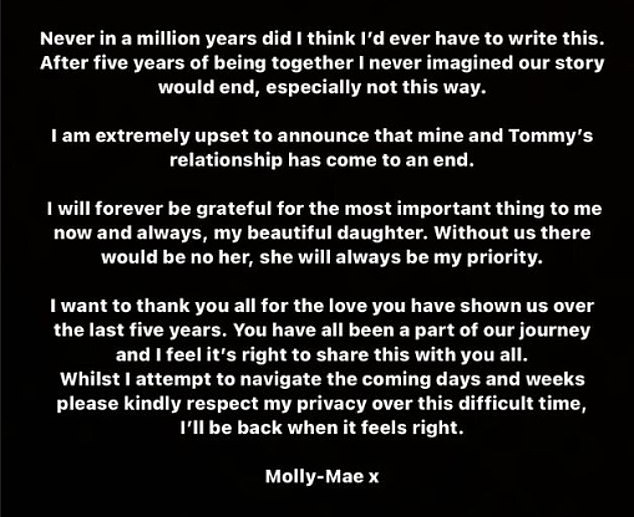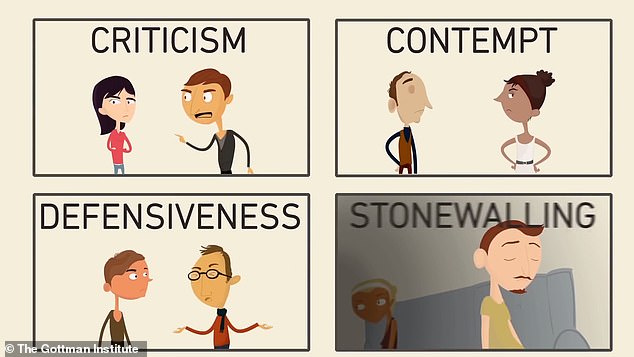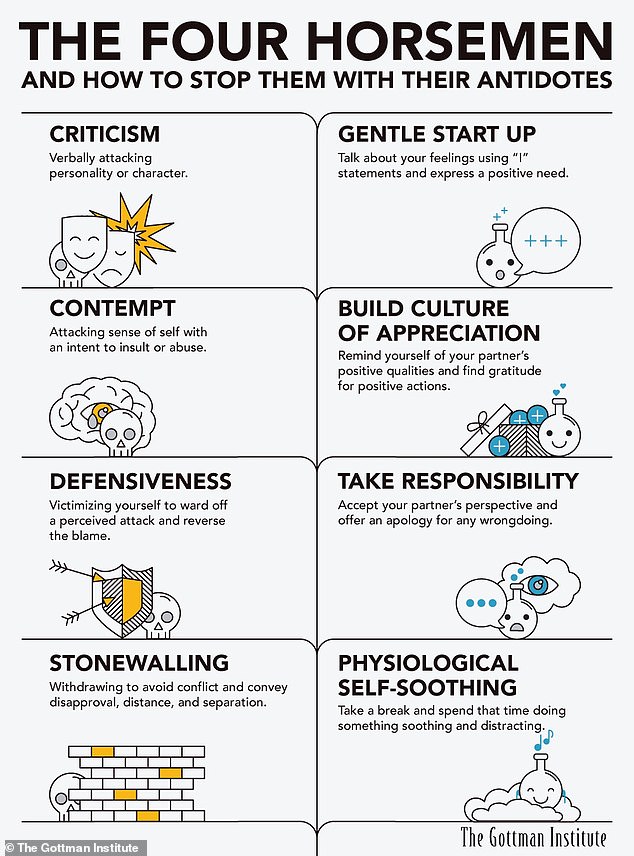The Science of Breakups: As Molly Mae and Tommy Fury Break Up, Scientists Reveal the 4 Biggest Signs a Relationship Is About to End
Love Island fans are devastated by the news that Molly Mae Hague and Tommy Fury have split.
After five years together, the couple has called it quits. Molly mysteriously says she ‘never thought our story would end like this, especially not like this.’
While the reason for the stars’ breakup remains unclear, science may be able to shed light on where it all went wrong.
Four negative communication styles are so deadly to relationships that they’ve been nicknamed the “Four Horsemen of the Apocalypse.”
According to research, they predict the failure of a relationship with over 90 percent accuracy. Could they help explain why Molly and Tommy called it quits?
Love Island fans are left stunned by the news that Molly Mae Hague and Tommy Fury have split. After five years together, they have split, with Molly mysteriously saying she ‘never thought our story would end, especially not like this’

While the reason for the stars’ breakup remains unclear, science may be able to shed light on where it all went wrong.
The Four Horsemen theory was developed in 1994 by Dr. John Gottman, an American psychologist and professor emeritus of psychology at the University of Washington.
Dr. Gottman recruited newlywed couples, who came to the lab for testing after not speaking to each other for the previous eight hours.
In the lab, the couples were filmed during three 15-minute conversations: one about the events of the day, one about marital conflict, and one about an unpleasant topic.
The researchers then coded the images for the presence of certain behaviors and emotional expressions.
Finally, the couples were approached again several years later to determine whether they were still together, or whether they had separated or divorced.
Based on the analysis, Dr. Gottman identified four key behavioral patterns – the so-called Four Horsemen of the Apocalypse – that indicate a couple is on the verge of breaking up.
1. Criticism
The first challenge is criticism. According to the Gottman Institute, this is “an attack on the core of your partner’s character.”
It is important to note that this is different from a complaint.
For example, a complaint might be: ‘I was scared when you were late and didn’t call me. I thought we had agreed that we would do that for each other.’
Criticism, on the other hand, might be: ‘You never think about how your behavior affects other people. I don’t think you’re so forgetful, you’re just selfish. You never think about others! You never think about me!’
If this sounds familiar, don’t panic. Fortunately, it doesn’t necessarily mean your relationship is doomed.
“The problem with criticism is that when it becomes pervasive, it paves the way for other, much deadlier riders to follow in their footsteps,” the Gottman Institute explains.
‘It makes the victim feel attacked, rejected and hurt. Furthermore, the perpetrator and victim often get into a pattern in which the first rider appears more and more often and more intensely, which ultimately leads to contempt.’

Tommy Fury and Molly-Mae Hague starred in season 5 of Love Island and were together for five years

The Four Horsemen theory was developed in 1994 by Dr. John Gottman, an American psychologist and professor emeritus of psychology at the University of Washington
2. Contempt
This brings us to the second horseman: contempt.
“When we communicate in this state, we are truly mean: we treat others with disrespect, mock them with sarcasm, ridicule them, call them names, and imitate or use body language such as eye rolling or mocking. The target of contempt is despised and devalued,” the Gottman Institute explained.
While criticism is an attack on someone’s character, contempt goes further. It implies a position of moral superiority over someone else.
According to experts, contempt is the biggest predictor of divorce.
3. Defense
Defensive behavior – usually in response to criticism – is the third horseman.
According to the Gottman Institute, defensiveness is “nearly ubiquitous” in relationships that end in divorce.
“When we feel unfairly accused, we make excuses and play the innocent victim so that our partner will withdraw,” the explanation goes.
Unfortunately, defending is almost never successful and by doing so we only indicate to our partner that we do not want to admit our mistakes.
“Being defensive is essentially a way of blaming your partner, and it gets in the way of healthy conflict management,” according to the Gottman Institute.

“Stonewalling occurs when the listener withdraws from the interaction, shuts down, and simply stops responding to his or her partner,” the Gottman Institute explains (stock image)
4. Opposition
Finally, there is the fourth horseman in the form of obstruction, which is usually a response to contempt.
“Stonewalling” occurs when the listener withdraws from the interaction, shuts down, and simply stops responding to his or her partner,” according to the Gottman Institute.
‘Rather than discussing the problems with their partner, people who are aloof may use avoidance maneuvers, such as shutting down, turning away, pretending to be busy, or exhibiting obsessive or distracting behavior.’
What can you do if you recognize one of the key signs that your relationship is heading for a breakup?
If the Four Horsemen are ringing alarm bells for you, experts say there are simple ways to banish them from your relationship.
The antidote to criticism is to “start softly,” meaning you begin a complaint with “I” instead of “you.”
For example, instead of saying, “You always talk about yourself. Why are you always so selfish?” you could say, “I feel left out of our conversation tonight and need to blow off some steam. Can we please talk about my day?”
The antidote to contempt is to create a culture of appreciation and respect.

Fortunately, if the Four Horsemen are ringing alarm bells for you, experts say there are simple ways to eliminate them from your relationship.
For example, instead of rolling your eyes and saying, “You forgot to load the dishwasher again? Yuck. You’re so incredibly lazy,” you could say, “I understand you’ve been busy lately, but could you please remember to load the dishwasher if I’m working late? I’d appreciate it.”
If you suffer from defensiveness, the Gottman Institute advises taking responsibility.
So instead of saying, “It’s not my fault we’re late. It’s your fault because you always get dressed at the last minute,” you can rephrase it as, “I don’t like being late, but you’re right. We don’t always have to leave so early. I can be a little more flexible.”
If you find yourself building up a wall, experts advise you to take a break during an argument and calm yourself down.
“If you do take a break, it should be at least 20 minutes long because that’s how long it takes for your body to physiologically rest,” the Gottman Institute explains.
“Spend your time doing something calming and distracting, like listening to music, reading, or exercising. It doesn’t really matter what you do, as long as it helps you calm down.”
